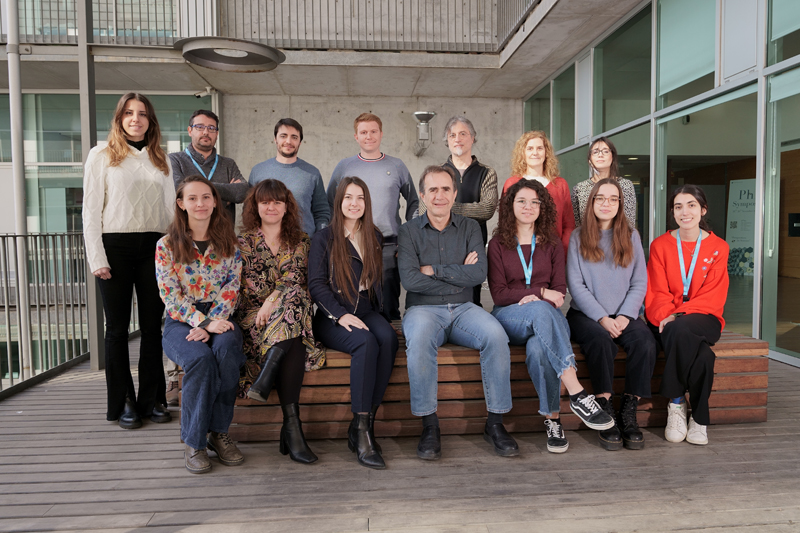 Ferrer Lab
Ferrer Lab
 Computational Biology and Health Genomics
Computational Biology and Health Genomics
- Group page
- Research lines
- Group members
- Publications
- Datasets
- Software
2022 Coordinator, Computational Biology and Health Genomics Programme, CRG
2021-2022 Coordinator, Medical Genomics Transversal Programme, CRG
2018 Senior Group Leader, CRG
2014-2018 Lead for Genetics and Genomics, NIHR Imperial BRC
2015 Fellow, Academy of Medical Sciences
2012- Professor and Section Head, Imperial College London
2009- Group Leader, CIBERDEM
2002-2018 Group Leader, IDIBAPS
2008 Sabbatical, UNC Chapel Hill
1997-2012 Specialist, Consultant in Endocrinology, Hospital Clinic
1996-1997 Postdoc and Instructor, Harvard Medical School, Mass. General Hospital
1993-1995 Postdoc, Washington University
1994 Doctor en Medicina. Universitat de Barcelona
1992 Endocrinology and Nutrition Medical Specialist, Spanish Ministry of Health
1986 Llicenciat Medicina. Universitat de Barcelona
Summary
Diabetes mellitus afflicts more than 400 million people. Current strategies to prevent and treat diabetes are limited by our scant knowledge of the molecular defects that cause diabetes. We focus on understanding changes in genome regulation that lead to monogenic and polygenic diabetes. We study the gene networks that are essential for insulin-producing beta cells to maintain glucose homeostasis, and develop strategies to manipulate these networks in human patients. We are also interested in how gene regulatory mechanisms can be harnessed for regenerative therapies in autoimmune diabetes. To achieve these goals, we combine regulatory genomics, human genetics, and genome engineering in model systems.
Featured publications
Transcription regulation by long non-coding RNAs and its disease relevance
Ferrer J*, Dimitrova N.
Nat Rev Mol Cell Biol, 2024. doi: 10.1038/s41580-023-00694-9
Matters arising: Insufficient evidence that pancreatic β cells are derived from adult ductal Neurog3-expressing progenitors.
Magenheim J, Maestro MA, Sharon N, Herrera PL, Murtaugh LC, Kopp J, Sander M, Gu G, Melton DA, Ferrer J, Dor Y.
Cell Stem Cell. 2023 Apr 6;30(4):488-497.e3. doi: 10.1016/j.stem.2023.03.003. PMID: 37028408.
Pancreas agenesis mutations disrupt a lead enhancer controlling a developmental enhancer cluster.
Miguel-Escalada I, Maestro MÁ, Balboa D, Elek A, Bernal A, Bernardo E, Grau V, García-Hurtado J, Sebé-Pedrós A, Ferrer J.
Dev Cell. 2022 Aug 22;57(16):1922-1936.e9
The HASTER lncRNA promoter is a cis-acting transcriptional stabilizer of HNF1A
Beucher A, Miguel-Escalada I, Balboa D, De Vas MG, Maestro MA, Garcia-Hurtado J, Bernal A, Gonzalez-Franco R, Vargiu R, Heyn H, Ravassard P, Ortega S, Ferrer J.
Nature Cell Biol (2022) Oct;24(10):1528-1540. doi: 10.1038/s41556-022-00996-8.
Human pancreatic islet 3D chromatin architecture provides insights into the genetics of type 2 diabetes
Miguel-Escalada I, Bonàs-Guarch S, Cebola I, Ponsa-Cobas J, Mendieta-Esteban J, Rolando D M.Y.,. Javierre B. M, Atla G, Farabella I, Morgan C.C., García-Hurtado J, Beucher A, Morán I, Pasquali L, Ramos M, Appel EVR, Linneberg A, Gjesing AP, Witte DR, Pedersen O, Garup N, Ravassard P, Torrents D, Mercader JM, Piemonti L, Berney T,de Koning WJP, Kerr-Conte J, Pattou F, Fedko IO, Prokopenko I, Hansen T, Marti-Renom MA, Fraser P, Ferrer J
Nat Genet. 2019 Jul;51(7):1137-1148. doi: 10.1038/s41588-019-0457-0. Epub 2019 Jun 28.
BioRxiv: 10.1101/400291
News
GenomeDia: Unlocking Personalised Medicine Through Diabetes Diagnostics (18/01/2024)
Researchers at the CRG led by Dr. Jorge Ferrer are embarking on a new project to improve the diagnostic accuracy of Diabetes Mellitus – a project which has today been selected for funding by the European Research Council with a €150,000 proof-of-concept grant.
Controversial beta cell origin theory challenged by diabetes experts (06/04/2023)
‘Tiny but mighty’ gene fragments are crucial for maintaining blood sugar levels (09/02/2023)
A research team at the CRG has now discovered that microexons are also found in another type of cell that carries out highly-specialised functions within complex tissues and organs – endocrine cells in the pancreas.
Human diabetes risk influenced by genomic regulation of RNA splicing (28/12/2022)
A research group led by Dr. Jorge Ferrer, senior researcher at the CRG and CIBERDEM, hypothesised that genetic variants that regulate RNA splicing could affect the transcription of genes linked to type-1 and type-1 diabetes risk.
Diabetes-causing gene can be regulated like a rheostat (27/10/2022)
Researchers at the CRG and Imperial College London have found a switch that regulates the activity of a gene that causes diabetes.
Researchers show how mutations in ‘dark genome’ cause pancreatic malformations (22/08/2022)
Researchers at the CRG have identified a DNA sequence that is crucial for pancreatic differentiation and function – and for the first time – describe how it works.
Fully functional pancreatic beta cells created from stem cells for the first time (03/03/2022)
In a study published in Nature Biotechnology, it has been demonstrated, for the first time, that stem cells can form cells that closely mimic normal pancreatic islets, in terms of both structure and function.
CRG and PerkinElmer’s SIRION Biotech to Develop New Generation AAV Vectors for Type-1 and Type-2 Diabetes Gene Therapy (16/02/2022)
PerkinElmer, Inc. today announced that its SIRION Biotech business and the Centre for Genomic Regulation (CRG) have entered into an agreement to jointly develop new generation adeno-associated virus (AAV) vectors for type 1 and type 2 diabetes gene therapy in the pancreas.
Pancreatic beta-cell boost in mice paves way for future diabetes treatments (12/08/2021)
A research team has uncovered the role of a gene that is critical to boosting the number of insulin-producing cells during the early development of the pancreas.
CRG researchers create 3D genome maps to find genetic mechanisms associated with type-2 diabetes (08/07/2019)
Scientists at the Centre for Genomic Regulation open up new ways of developing personalised treatments for type-2 diabetes
Funding Acknowledgements


Our IMPaCT project with official reference PMP21/00067 and granted by the ISCIII, under the "ImpactT2D: una estrategia genómica para implementar medicina de precisión en la diabetes tipo 2", has received funding from the ISCIII and the European Union NextGenerationEU/PRTR.

The project “DESARROLLO DE TERAPIAS DIRIGIDAS A MECANISMOS GENETICOS SUBYACENTES A LA DIABETES NO-AUTOINMUNE” (PID2021-122522OB-I00) is funded by Agencia Estatal de Investigación (AEI), the Ministerio de Ciencia e Innovación and Fondo Europeo de Desarrollo Regional (FEDER). Project PID2021-122522OB-I00 funded by MCIN/ AEI / 10.13039/501100011033 / FEDER, UE
Regulatory genomics and type 2 diabetes
The molecular underpinnings of type 2 diabetes are largely unknown. Several lines of evidence, including work from our team, indicate that the regulation of genome function in pancreatic islets has direct relevance to the pathophysiology of type 2 diabetes. Our work is aimed at dissecting the gene regulatory mechanisms that underlie type 2 diabetes.
Therapeutic targeting of regulatory defects in human diabetes
Understanding the molecular derangements underlying diabetes enables the development of disease-modifying therapies. We aim to develop therapeutic approaches to manipulate critical targets in diabetes-relevant networks.
What role do lncRNAs play in genome function?
The human genome contains tens of thousands of long noncoding RNA (lncRNA) genes that do not encode for proteins. Some lncRNAs have been shown to have genome regulatory functions, although in most cases their function is unknown. We identified beta-cell selective lncRNAs, and showed that inhibition of some of these lncRNAs impacts cell-specific transcriptional networks. We now deploy genetic and molecular approaches to dissect the mechanisms whereby specific lncRNAs control gene transcription in pancreatic islet cells.
Noncoding genome variation in Mendelian diabetes
Most known Mendelian mutations lie in protein-coding sequences, yet nearly 50% of patients who appear to have Mendelian phenotypes remain unsolved after clinical sequencing. A significant number of such patients may thus harbor causal defects in the noncoding genome. Recent studies has shown that a rare recessive form of diabetes is indeed caused by point mutations in a transcriptional enhancer, rather than a protein coding gene. The systematic discovery of new noncoding defects faces several challenges. Whole genome sequencing can detect most noncoding genetic variants, but our ability to interpret noncoding DNA variation is still extremely limited. We now combine functional, computational and genetic approaches to discover new forms of diabetes caused by enhancer mutations, and to establish principles underlying noncoding mutations in human disease.




